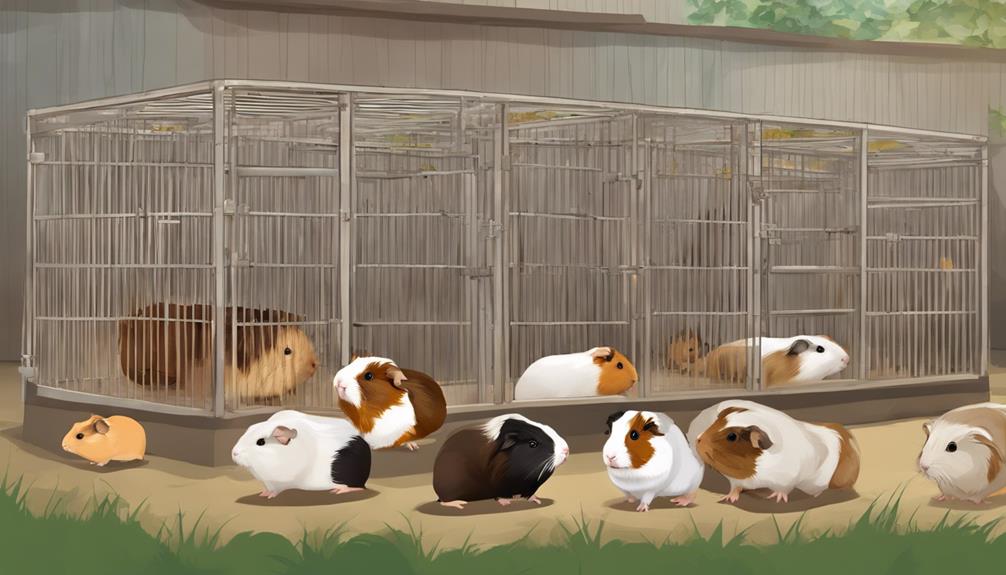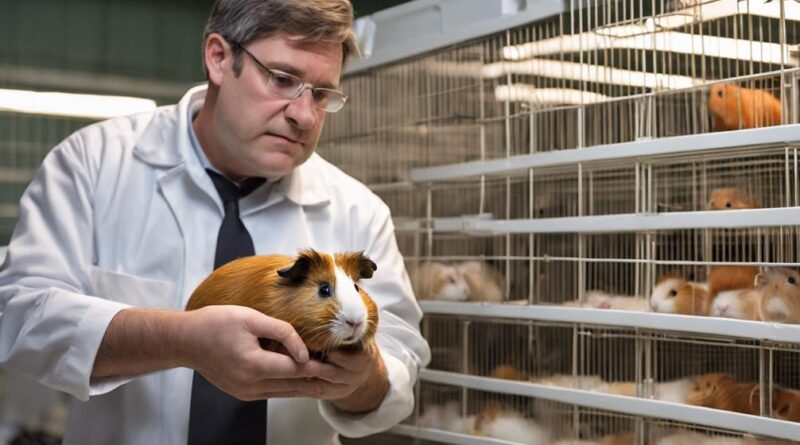Why Is Breeding Guinea Pigs Regulated by Law?
You've probably heard the saying, 'With great power comes great responsibility.' When it comes to breeding guinea pigs, this rings especially true.
Have you ever wondered why there are specific laws and regulations governing this seemingly harmless practice?
The reasons run deeper than you might think, touching on aspects of animal welfare, genetic diversity, and even the sustainability of rescue organizations.
Let's explore the intricate web of reasons behind the legal framework surrounding guinea pig breeding.
History of Guinea Pig Legislation
Throughout the history of guinea pig breeding, laws have played a crucial role in regulating the industry. The evolution of laws surrounding the breeding of guinea pigs reflects shifting cultural attitudes towards these small animals. In ancient times, guinea pigs were primarily kept for food and sacrificial purposes. As societies evolved, so did the laws governing the treatment of these animals.
In the Middle Ages, guinea pigs began to be bred for companionship rather than consumption, leading to the establishment of laws aimed at protecting them from cruelty. These early regulations marked the beginning of a more compassionate approach towards guinea pig breeding practices.
During the Industrial Revolution, as urbanization increased and more people kept guinea pigs as pets, laws became more specific in addressing their welfare. The shift towards viewing guinea pigs as beloved companions led to stricter regulations regarding their housing, breeding conditions, and overall well-being.
In modern times, laws continue to evolve to reflect society's changing attitudes towards animal welfare. Today, regulations not only focus on preventing cruelty but also emphasize the importance of providing enrichment and proper care for guinea pigs. Cultural attitudes towards these animals have shifted from utilitarian to empathetic, resulting in more comprehensive laws that ensure the well-being of guinea pigs in breeding facilities.
Health and Welfare Regulations
As laws have progressed to prioritize the well-being of guinea pigs, current health and welfare regulations enforce stringent standards for breeding facilities. These regulations play a crucial role in preventing overpopulation and ensuring proper care for these small animals.
To prevent overpopulation, breeding facilities must adhere to strict guidelines that regulate the number of guinea pigs that can be bred within a certain period. By controlling the breeding rate, authorities aim to avoid situations where an excessive number of guinea pigs are produced without the capacity to care for them adequately. This measure helps maintain a balance between the supply and demand for guinea pigs, ultimately benefiting the welfare of the animals.
In addition to preventing overpopulation, health and welfare regulations also focus on ensuring proper care for guinea pigs in breeding facilities. These regulations cover various aspects such as providing adequate living space, proper nutrition, access to clean water, and veterinary care when needed. Breeding facilities must meet these requirements to guarantee that the guinea pigs are raised in a safe and healthy environment.
Licensing and Permits Required
To breed guinea pigs legally, obtaining the necessary licensing and permits is a crucial requirement. Without the proper authorization, breeding practices may not adhere to established breeding regulations and could potentially compromise animal welfare. Here are some key points to consider when it comes to licensing and permits:
- Ensuring Compliance: Obtaining a license ensures that your breeding practices meet the standards set by breeding regulations, safeguarding the well-being of the guinea pigs involved.
- Accountability: Having the required permits holds breeders accountable for their actions, promoting responsible breeding and reducing the risk of exploitation or neglect.
- Monitoring and Oversight: Licensing allows for proper monitoring and oversight of breeding facilities, helping to prevent overcrowding, unsanitary conditions, and other factors that could harm the guinea pigs.
- Legal Protection: Operating without the necessary permits not only jeopardizes animal welfare but also exposes breeders to legal consequences, emphasizing the importance of following breeding regulations.
Limitations on Breeding Practices
Breeding guinea pigs must adhere to specific restrictions to ensure the well-being of the animals involved and maintain compliance with breeding regulations. Ethical considerations play a crucial role in determining the limitations on breeding practices. It's essential to prioritize the welfare of the guinea pigs over breeding for profit or other purposes.
Population control is another significant factor influencing breeding practices. Responsible breeding aims to prevent overpopulation and minimize the risk of neglect or abandonment of guinea pigs. By imposing limitations on breeding, authorities can work towards maintaining a sustainable population that's manageable and well-cared for.
Ethical considerations also encompass avoiding inbreeding, which can lead to genetic health issues in guinea pigs. Regulations often restrict breeding practices to ensure that genetic diversity is maintained within the guinea pig population. This helps prevent the spread of hereditary diseases and promotes overall well-being among the animals.
Enforcement and Penalties
Enforcement of breeding regulations is crucial to ensure compliance and deter violations that impact the well-being of guinea pigs and the sustainability of their population. Without effective enforcement measures, breeders may neglect the welfare of these animals, leading to potential harm and endangerment of the species. To maintain the integrity of breeding practices and safeguard the guinea pig population, legal consequences and enforcement measures are essential.
As a breeder, you must understand the gravity of non-compliance with breeding regulations. The enforcement of these laws isn't just a formality; it's a lifeline for the well-being of guinea pigs. Consider the following emotional aspects related to enforcement and penalties:
- Helplessness: Witnessing the suffering of guinea pigs due to violations can evoke feelings of helplessness.
- Outrage: Knowing that some breeders disregard regulations and jeopardize the safety of these animals may provoke outrage.
- Empathy: Putting yourself in the shoes of the guinea pigs can evoke empathy towards the importance of enforcement.
- Hope: Enforcing breeding regulations offers hope for a future where guinea pigs are treated with care and respect.
Importance of Genetic Diversity
Maintaining genetic diversity is crucial for the long-term health and vitality of guinea pig populations. When breeding guinea pigs, genetic selection plays a significant role in ensuring that desirable traits are passed down while minimizing the risks of inbreeding.
Genetic selection involves choosing breeding pairs based on their genetic makeup to promote diversity and reduce the likelihood of inherited health issues. By consciously selecting mates that complement each other genetically, breeders can help prevent the negative consequences associated with inbreeding, such as an increased incidence of genetic disorders and weakened immune systems.
Inbreeding risks arise when closely related guinea pigs are bred together, leading to a limited gene pool and higher chances of genetic abnormalities. Without enough genetic diversity, populations become more susceptible to diseases and other health complications, ultimately impacting the overall well-being of the animals.
Impact on Rescue Organizations

To fully grasp the significance of genetic diversity in guinea pig populations, it's essential to consider its impact on rescue organizations.
Rescue organizations play a crucial role in providing a second chance to guinea pigs in need. Here's how genetic diversity regulations affect them:
- Increased Demand: Stricter breeding laws often lead to more guinea pigs needing rescue, increasing the demand for adoption.
- Challenges in Matching: Limited genetic diversity can make it harder for rescue organizations to find suitable matches for adopters, impacting the adoption process.
- Health Concerns: Inbreeding due to a lack of genetic diversity can result in various health issues, making the adoption process more complex.
- Volunteer Burnout: With a higher influx of guinea pigs needing care, rescue organizations may face volunteer burnout, affecting volunteer opportunities.
These factors emphasize the critical role genetic diversity plays in the operations of rescue organizations. By promoting responsible breeding practices and ensuring genetic variation, the burden on rescue organizations can be lessened, ultimately benefiting the well-being of guinea pigs in need of a loving home.
Future Trends in Guinea Pig Laws
Looking ahead, there are emerging trends in guinea pig laws that signal a shift towards promoting responsible breeding practices and safeguarding genetic diversity. One significant trend on the horizon is the increasing emphasis on genetic research to enhance the health and well-being of guinea pigs. By delving into genetic studies, breeders can make more informed decisions to prevent hereditary diseases and promote overall genetic diversity within guinea pig populations.
Another crucial trend shaping future guinea pig laws is the implementation of breeding restrictions. These restrictions aim to curb irresponsible breeding practices that often lead to health issues in guinea pigs. By setting specific breeding guidelines and limits, authorities seek to ensure that only healthy and genetically diverse guinea pigs are being bred, reducing the prevalence of genetic disorders within the population.
Frequently Asked Questions
Can Guinea Pig Breeding Be Considered a Profitable Business?
Breeding guinea pigs might seem like a profitable venture due to their popularity as pets. However, profit margins can vary based on demand and market saturation.
Furthermore, ethical concerns surrounding breeding practices can impact the business.
It's essential to consider both financial aspects and the welfare of the animals when deciding if guinea pig breeding can be a profitable business for you.
Are There Specific Restrictions on Breeding Guinea Pigs for Pet Shows or Competitions?
When it comes to ethical breeding for pet shows or competitions, there are specific restrictions in place to ensure the well-being of guinea pigs. Show requirements often dictate breeding standards to promote healthy and genetically diverse animals.
Following these guidelines not only benefits the guinea pigs but also upholds the integrity of the competitions. It's essential to adhere to these regulations to maintain the quality of guinea pigs participating in shows.
What Role Do Veterinary Professionals Play in Regulating Guinea Pig Breeding Practices?
Veterinary professionals play a crucial role in regulating guinea pig breeding practices. They provide oversight to ensure breeding standards are met, promoting the health and well-being of the animals.
How Do Laws Regarding Guinea Pig Breeding Vary Between Different Countries or Regions?
In different countries or regions, cultural differences influence breeding regulations for guinea pigs. These laws vary widely, impacting the economy and breeding practices.
Some areas have strict rules to ensure ethical treatment of animals, while others may have more relaxed regulations. Understanding these differences is crucial for anyone involved in guinea pig breeding, as compliance with local laws is essential for the well-being of the animals and the sustainability of the industry.
Are There Any Specific Guidelines for Responsible Breeding Practices to Ensure the Health and Well-Being of Guinea Pigs?
To ensure guinea pigs' health and well-being, follow genetic testing and ethical breeding practices. Maintain breeding standards by conducting health checks regularly.
Screen for hereditary diseases and select healthy breeding pairs. Provide proper care, nutrition, and living conditions for pregnant guinea pigs and their offspring.
Conclusion
In conclusion, breeding guinea pigs is regulated by law to ensure the health and welfare of these animals. Licensing and permits are required to control breeding practices and enforce penalties for violations.
Genetic diversity is crucial for the well-being of guinea pigs, and regulations also impact rescue organizations. As laws continue to evolve, the future of guinea pig breeding will likely focus on promoting responsible practices and safeguarding the species.
